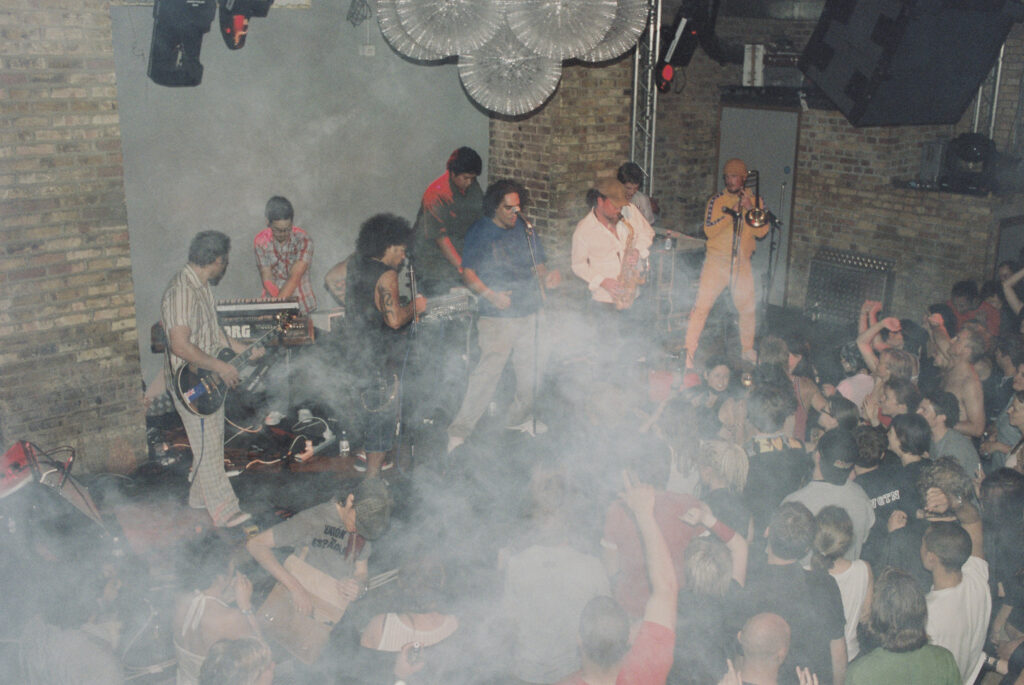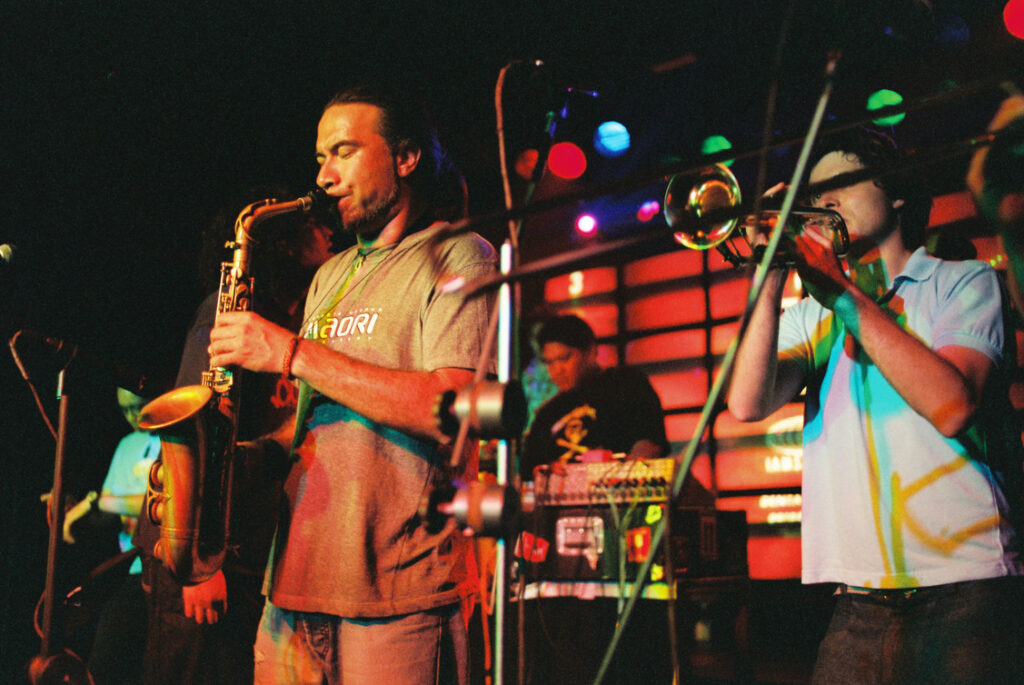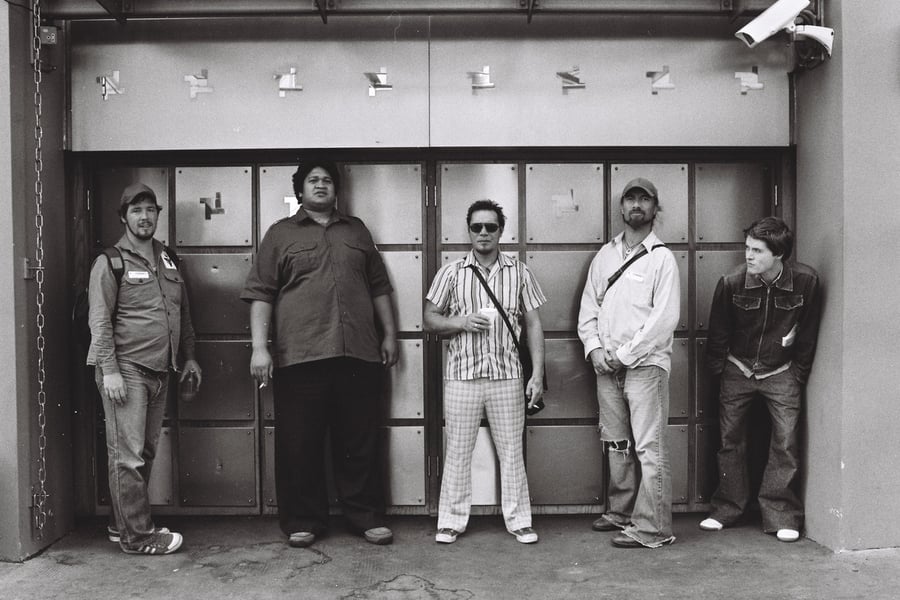They’re one of New Zealand’s most iconic bands, who continue to push boundaries even with an impressive 25-year career behind them, but it all started out humbly for Fat Freddy’s Drop with informal jam sessions in Wellington in 1999.
The seven-piece collective, known for their masterfully smooth songs with rich soul, jazz, and reggae infusions, has commanded attention across Aotearoa, and the rest of the world, since their inception.
It began with Chris Faiumu, and two friends, vocalist Dallas Tamaira and trumpet player Toby Laing, playing together in 1999. The quickly generated a buzz and within a year, the collective grew to include another four talented instrumentalists, including trombone and tuba player Joe Lindsay.
“We developed this reputation for these big longform jams,” Lindsay tells Rolling Stone AU/NZ.
As audiences signalled an interest in taking a slice of the live experience home, the group put out a live album titled Live at the Matterhorn – a four-track 70-minute session recorded in front of an audience at the Matterhorn restaurant in Wellington’s Cuba Mall. With nearly 10,000 sales in the first few months, it was evident fans were clamouring for more.
“We’re essentially a sound system as well as a band. The great thing about it was, no matter what, the beats were always fat,” Lindsay adds.
“Even when there weren’t any other instruments playing, the beats still sounded huge – elements of dance and reggae sound system were there. Having a massive sound was really important for the live performance – no matter what they’ve got to be fatter.
Love Music?
Get your daily dose of everything happening in Australian/New Zealand music and globally.
Their third single, the enchanting “Midnight Marauders”, started to gain international traction and was picked up by French DJ Gilles Peterson as one of his favourite songs of the year. The response acted as yet another indication there was demand for an album of original tracks by Fat Freddy’s Drop.
“That was up to us to try and condense this sorta live monster into a studio monster. That was quite a long process,” Lindsay explains.
With some rumblings of interest in Germany and Berlin – thanks to an American DJ who sprinkled seeds of the band’s existence after picking up a vinyl copy of Midnight Marauders – the group grew eager to find success beyond the New Zealand border.
“The idea of the band and the album was all based on word of mouth, and in many ways with Freddy’s, it’s still the kind of band that you tell your friends about and they become fans,” Lindsay continues.
“I think it was for those in the know, they were trading on this great record, meanwhile we’d been doing a lot of gigs in New Zealand, building up a good reputation, so by the time we got to Europe we had our ‘thing’ pretty solid. It was just a matter of introducing it to the European audiences.”
The band decided to base themselves in Europe for a few months and spend time in London to see what they could drum up, playing as many festivals as they could at the same time. According to Lindsay, their success over there “snowballed” between 2003 and 2004.
They took along a friend of the band, Sarah Hunter, whose role was to capture what they got up to on a Handycam, which included the members writing songs for what would become their debut studio album, [2005’s] Based on a True Story.
“I was always documenting and photographing – on the sidelines – and capturing those special moments, then Freddy’s started to bobble away,” Hunter remembers.
With nine people tucked into a three-to-a-room townhouse in Tooting, South London, over six weeks Hunter caught a behind the scenes glimpse into the early days of the band.
Those moments have now been transformed into a documentary series, Marauders, released through RNZ and directed by Hunter, taking fans deep into the band’s debut European tour that acted as a launchpad for the massive success Fat Freddy’s Drop are celebrated for today.
It’s given not only fans but the band a chance to reminisce about what came before.
“Freddy’s is a band that’s about sitting around and jamming and making that music happen, that is what is always pushing the boundary. Watching the evolution of that live performance, the call and response with the audience, you can see Joe’s energy from 20 years ago to now – unstoppable,” Hunter says.

Credit: Sarah Hunter
Across seven studio albums and two live records, Fat Freddy’s Drop have always sounded like a true Aotearoa band, developing a laid-back, multi-layered, and charming sound that spoke to the New Zealand people but equally struck listeners abroad.
“The way Freddy’s makes music with that human connection, the way they play with the human connection, that’s what people get,” Lindsay says.
Known as ‘Mu’, Chris Faiumu is regarded as the driving force of the band, originally uniting the Fat Freddy’s Drop members but also guiding their sound.
Typical jam sessions will kick off with him creating a bassline on the MPC, a sample sequencer, while Tamaira comes in with some ideas on vocals. With a rhythm from the guitar and melody from the keys, the horns will feel out their place, figuring out their input before stepping up and showing what they’ve got.

Credit: Sarah Hunter
Maintaining a quality live performance creates a challenge – but Lindsay says the band is more motivated than ever to continue to deliver the goods and keep their shows fresh.
Today, founding members Mu, Laing and Tamaira alongside Scott Towers, Iain Gordon, and Lindsay have made delivering what an audience wants to hear into an art form – it’s a feat that grew harder once the band collected an extensive list of acclaimed hits.
“Some of these tunes we’ve been performing thousands of times,” Lindsay acknowledges, “but I think if you’re invested in a band then often it’s good to actually have an open mind and want to listen to new stuff.”
Songs like the soulful, jazz-infused “Wandering Eye” – which spent over four months on the local top 40 singles chart – became a fan favourite quickly, but there’s a desire to go beyond the songs as they’re heard on the radio and not play them to death.
“We felt a lot of pressure to play that one a lot and then we thought, ‘Ok, we’re not doing this justice anymore, we’re not really feeling it, so let’s just give it a rest,’ and it never really came back. Just recently we’ve started [to] tease it just to remind people.”
The depth to Fat Freddy’s Drop’s music can be attributed to their recording processes – just jamming together, often from free-form improvisation. It’s a credit to the level of skill involved in the collective, a group of musicians who are deeply passionate about finding new sounds.
“I’m a much better trombone player than I was when I first started, I hope,” Lindsay says. “Feeling that progression, knowing how to get to the good stuff, how to drill down to get it to where you need it go – and having those shortcuts into that space of improvisation and perfecting your phrasing and all that is that is really enjoyable.
“It’s just such a buzz. You get addicted to feeling a high off other people’s energy – that’s a big part of it.”
Watch the Fat Freddy’s Drop documentary series Marauders via RNZ. The band’s tour information can be found here.



































